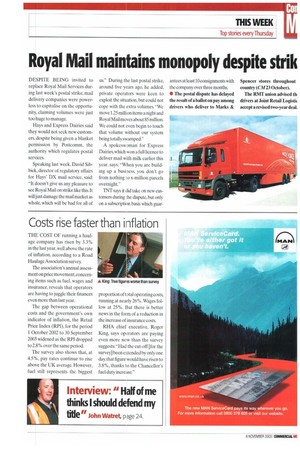Royal Mail maintains monopoly despite strik
Page 13

If you've noticed an error in this article please click here to report it so we can fix it.
DESPITE BEING invited to replace Royal Mail Services during last week's postal strike, mail delivery companies were powerless to capitalise on the opportunity, claiming volumes were just too huge to manage.
Hays and Express Dairies said they would not seek new customers, despite being given a blanket permission by Postcomm, the authority which regulates postal services.
Speaking last week, David Sibhick, director of regulatory affairs for Hays' DX mail service, said: "It doesn't give us any pleasure to see Royal Mail on strike like this. It will just damage the mail market as whole, which will be had for all of us." During the last postal strike, around five years ago. he added, private operators were keen to exploit the situation, but could not cope with the extra volumes. "We move 125 million items a night and Royal Mail moves about 85 million. We could not even begin to touch that volume without our system being totally swamped."
A spokeswoman for Express Dairies, which won a full licence to deliver mail with milk earlier this year. says: "When you are building up a business, you don't go from nothing to x-million parcels overnight."
TNT says it did take on new customers during the dispute, but only on a subscription basis which guar antees at least 10 consignments with the company over three months.
• The postal dispute has delayed the result of a ballot on pay among drivers who deliver to Marks & Spencer stores throughout country (CM 23 October).
The RMT union advised tit drivers at Joint Retail Logistic accept a revised two-year deal.
































































































































































































